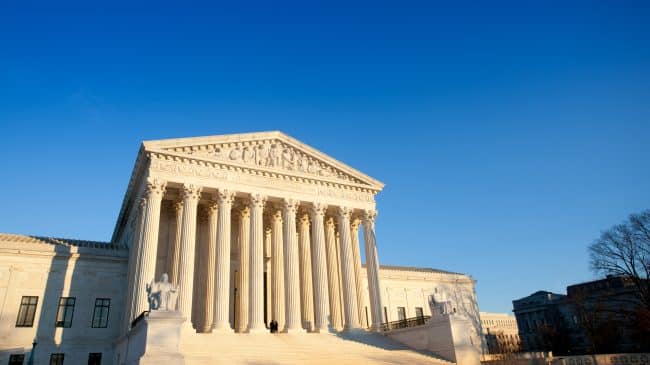The U.S. Supreme Court will hear a case in 2024 on whether Florida and Texas laws prohibiting privately owned social media platforms from removing content based on viewpoint are constitutional. The Supreme Court’s opinion in the cases, Moody v. NetChoice and NetChoice v. Paxton, is expected to be highly consequential for the future of online speech, freedom of association, and content moderation.
Reason Foundation and several co-signers submitted an amicus brief to the Supreme Court, agreeing with NetChoice that both state laws violate the First Amendment. The brief states:
“The editorial decisions and content moderation policies of social media platforms, large or small, are exercises of the freedom of speech, the freedom of the press, and the freedom of association protected by the First Amendment. Efforts to force such companies to convey or associate with viewpoints or persons with which or whom they disagree or otherwise choose to disassociate from thus violate the First Amendment.”
The cases arose from Texas and Florida laws passed by state officials concerned that widely used platforms like Facebook and Twitter (now X) were removing content that expressed conservative views, particularly on hot-button issues like COVID-19 pandemic responses and the validity of the 2020 election results. But, the critical First Amendment issues upon which the court will rule do not relate to the nature of these specific views or controversies or anyone’s right to speak about them.
The Florida and Texas laws violate the First Amendment rights of private social media platforms, which build user bases by facilitating and moderating content in ways the users find beneficial. Supporters of the state laws and lower court rulings on this case repeatedly lose track of this distinction.
Reason Foundation’s amicus brief concurs with NetChoice on three primary points:
- The decision of who and what content to include or exclude on a social media platform is fundamental to the First Amendment rights of those organizing the platform and the individuals freely choosing to associate or not with that platform.
- The so-called common carrier doctrine, used at times to require government-regulated utilities and broadcasters to accommodate minority viewpoints, makes no sense in a dynamic technological environment that features firms with temporarily large market shares but an unprecedented array of outside options where individuals can speak.
- Governmental benefits provided to corporations and interactive platforms (including Section 230, which shields platforms from some liability from speech by third parties on those platforms) do not require these organizations to forfeit other First Amendment rights.
The rise of social media in the 21st century has combined the ways we communicate with each other and acquire information from media sources in novel and sometimes disorienting ways. But the vast body of precedent from older cases cited in Reason Foundation’s amicus brief, which is the source of the quotations below, shows that this disruptive process, and its propensity to raise legal questions, is far from new.
Courts have decided related questions in cases involving, but not limited to, print outlets, broadcast and cable television media, public utilities, political advocacy groups, religious organizations, and shopping malls. They have found in favor of these private organizations’ rights to include and exclude content and speakers with striking reliability. The Reason brief notes:
“The selective inclusion for dissemination of some speech or speakers, and the selective exclusion of other speech or speakers, constitutes the speech of the editor or organizer, not merely the speech of the individual participants contributing to the collective whole.”
Critics of tech companies often present social media as having little diversity and being susceptible to the whims of a few corporations. But this is a restrictive and misleading view of the still-expanding array of online choices and the different ways social media communities are and can be arranged. As the brief put it:
“That some platforms are more pluralistic than most, and tolerate a considerable diversity of persons and viewpoints, does not mean they must tolerate all persons and viewpoints, or that they cannot prioritize and organize the discussions in their forums as they see fit. That is the essence of the ’freedom’ protected by the First Amendment and the associational choices that fall within such freedom.”
Critics’ overly homogenous and static view of social media may have contributed to the misguided idea that the largest platforms should be declared common carriers. Such a policy would create perverse incentives punishing success, though even how to practically implement such rules strains common sense:
“Here, the transitory dominance of the more popular social media platforms is not even remotely a roadblock to competing platforms or even individual speech. And the shifting choices and politics of different platforms creates a constant churn that makes arguments based on market dominance, essential facilities, or other antitrust analogies largely absurd. Twitter has transformed into X, with different views on content moderation, and new social media platforms come and go, with something for everyone, whether it is the proliferation of Reddit subgroups, Truth Social, Instagram, Threads, Tumbler, or even 4chan for those who prefer the wild, wild west of social media.”
Finally, the protections afforded by Congress to digital platforms from liability from some third-party speech associated with Section 230 remain a separate legal matter, and those protections in no way require platforms to forfeit other First Amendment rights:
“As an initial matter, while the protections of Section 230 are not required by the First Amendment, those protections cannot be conditioned on the sacrifice of First Amendment protections. Congress, for its own quite good reasons, adopted Section 230 to limit the litigation risk of social media platforms and users that transmit “information content” produced by others.”
Indeed, the brief explains the practical user experience of social media platforms and makes clear the difference between Section 230 protections and the right to moderate content as a matter of common sense:
“The fundamental point of Section 230 is that platforms do not adopt the speech of others merely by transmitting it to others, not that they are engaged in no First Amendment-protected activity at all. Certainly, by excluding some content or users, the platform is saying something about what is allowed to remain. But what they are saying may be ‘this is interesting,’ ‘you might want to see this,’ or ‘this is acceptably tolerable’ rather than ‘this is right’ or ‘I agree.'”
Reason Foundation believes that the Supreme Court should find the state laws at issue in Moody v. NetChoice and NetChoice v. Paxton unconstitutional. Such a ruling would not make vigilance or concern over the moderation decisions of social media platforms unwarranted, as platforms could certainly still make bad or unfair moderation decisions. But that is their right.
Our expanding social media environment provides private and individual solutions to these concerns. Consider the plight of a group with strongly dissenting opinions—large or small, and irrespective of ideology. The country’s media has progressed through stages dominated by print, broadcast, cable television, online journalism, and now social media. At almost every stage, the options open to such groups to speak to each other and make their views available to the world at large have grown in variety and shrunk in cost. The opportunities for others to engage—or exercise their right not to—have similarly expanded.
These positive trends have been driven by an often messy and occasionally harrowing process that heavily favors the rights of individuals and groups to both speak and to decide to whom they will and will not speak. Trying to stop this process with politically motivated and short-sighted laws is counterproductive. The Supreme Court should rule the Texas and Florida social media laws unconstitutional.

